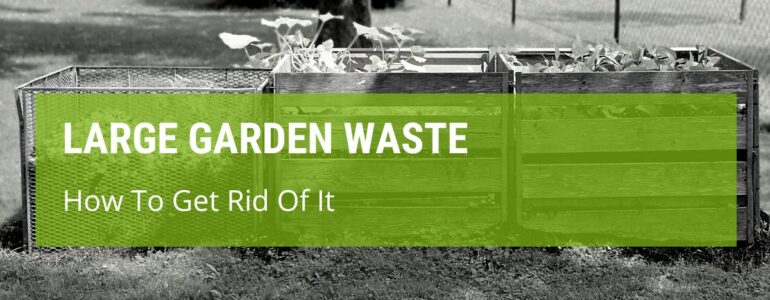Clearing out the garden can be so satisfying, can’t it? You’ve finally managed to hack down the jungle, and you’re finally getting rid of that broken garden furniture! But how to get rid of large garden waste?
Smaller bits are fine; you can generally compost them or put them in the bin – but what about the big stuff? Good news – we are here to help you decide how to do this.
How To Get Rid Of Large Garden Waste
Getting rid of your garden waste will depend on what sort of waste you are trying to get rid of.
If it is weeds, plants and even trees, this will be dealt with differently than broken chairs and tables!
If you have some considerable amounts of garden waste, first you will need to separate them into different sections:
- Green waste, such as garden trimmings and clippings, can be composted either in your own pile, or in a council bin.
- Furniture can either be burnt on a bonfire if it is wood, sold on if it is metal, or recycled, depending on the condition that it is in.
- Trees may have to be dealt with by a tree surgery company – they can either take them away or chip them into mulch that you can use in the garden.
- Topsoil, if you have a lot of it that needs getting rid of, is best disposed of in your local tip. They have the facilities for it, and can even turn it back into usable compost.
- Broken up concrete or paving slabs will definitely need to be taken to the tip, to be disposed of safely and responsibly.
Getting rid of large garden waste can be as simple as composting and mulching and having a bonfire, or it might involve a trip or two further afield.
Whatever you do, make sure you dispose of your large garden waste responsibly – no one needs to see things fly-tipped in lay bys!
Here is a great article telling you what you can do with your twigs and branches.
Can Garden Waste Go In Black Bags?
When you are trying to get your garden waste disposed of, it may be easier for you to just put the waste into your black bags.
This is absolutely fine, but do remember that you should separate the things that can be composted and recycled, rather than just shoving everything into a black bag!
Your garden waste that is green, such as grass cuttings and trimmings, should be composted. Green waste can be turned into other useful compost.
If you find something from your garden that absolutely cannot be recycled or composted in some way, then it is fine to put it in your black bags for collection.
How Do You Remove Large Amounts Of Soil?
If you have recently removed large amounts of soil from your garden, you may be scratching your head about what to do with it. You are not alone!
Removing a mountain of soil can be tricky, if you have not other bed to put it in, or if it is not suitable for growing more plants in. There are options though!
- Hire a skip. This can be filled and removed – yes there will be a cost, but it’s worth it for your super clean garden, right?
- Advertise it. There are people all over the place crying out for topsoil; why not turn your waste into someone else’s treasure?
- Make it into something. If you can’t get rid of it, try to enjoy it! Make it into a mountain for the kids to climb, or allow it to become a rewilding project.
Can You Dump Soil In Woods?
In short, the answer to this question is, No you can’t. But why, I hear you cry – surely it’s just soil?
Well, the type and the amount of soil can make a huge difference – sometimes catastrophically so – to our local ecosystems.
The soil from your garden is almost certainly completely different from the soil that you can find in the woods, so dumping your soil can seriously affect the environment.
Also, garden soil can become contaminated with pests and diseases, which we really don’t want to be releasing into the wild!
Another good point to remember is that fly tipping is illegal. Even if you are fly tipping soil, this can still land you in serious trouble.
What Do Local Councils Do With Garden Waste?
You might be wondering if it’s a waste of time to put your garden waste in your council bins – surely they’ll just put it into landfill?
Well, actually it’s a much better scenario than that! Your garden waste can actually be put to really good use.
- Garden waste that arrives at a recycling facility will have anything that is not compostable removed, before it continues to be treated.
- The waste that is compostable is shredded finely, then laid out in a long pile to allow decomposition to happen.
- The waste is subject to high temperatures due to the decomposition; sometimes up to 60 degrees C!
- The high temperatures allow decomposition to happen safely and to kill off harmful bacteria, whilst still allowing beneficial microbes and bacteria to survive.
- The material is frequently turned over, allowing oxygen to reach the good microbes in the composition.
- Finally, the compost is checked and screened to make sure that it contains no contaminants, and is graded to prevent any harmful particles getting into the finished product.
- This is now perfectly usable compost, and it can be bagged up and sold to people who want to use it in their gardens.
If you want to know more, check out this video about what happens to your garden waste:
Final Words
Getting rid of large waste from your garden can feel a bit like a headache, especially if there is piles and piles of it! Follow our advice for disposing of it safely and legally, and don’t be tempted to go fly tipping around the countryside.



